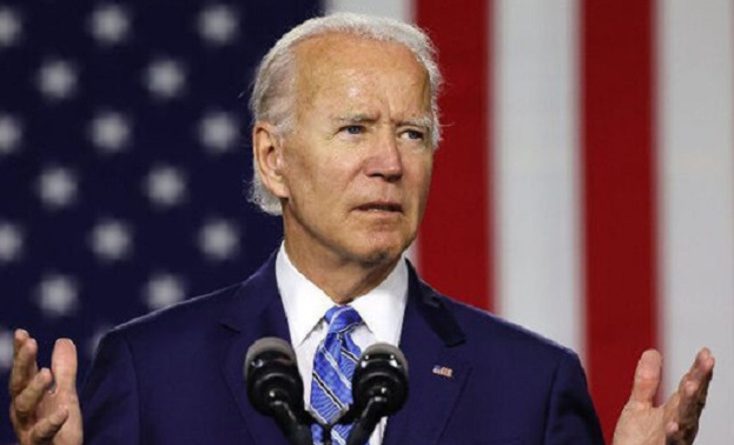Important Warning Joe Biden / The Great War is on the way?
In his first speech to the Pentagon, the US president stressed the need to “stand up to the challenges posed by China” and said that the Pentagon had set up a working group to evaluate China’s policies.
Speaking at the Pentagon on Wednesday, US President Joe Biden said Washington would not hesitate to use its military power to respond to any aggression against the United States.
“We will pursue policies that serve the interests and goals of the United States,” he said.
Emphasizing the need to “stand up to the challenges posed by China,” he said the Defense Ministry has set up a working group to evaluate China’s policies.
Biden called for strengthening US cyber capabilities, saying that in the new competitive era, the United States must be at the forefront of deep-sea to space technology.
The US president also welcomed the release of Saudi human rights activist Lajin al-Hazloul from the Saudi regime’s prisons, calling it “good news”.
Warning to the United States: Iran does not agree to your terms
Iranian diplomacy: In an interview with Al-Arabiya last Friday, French President Emmanuel Macron said that Saudi Arabia should be present in any future talks with Iran and stressed that removing the countries in the region from nuclear talks with Iran in 2015 was a big mistake. The French president also reiterated the long-standing demands of Saudi Arabia, the United Arab Emirates and Israel for the need to address Iran’s regional activities and missile program, as well as the nuclear issue in any future agreement. But if the United States and the European parties (Britain, France and Germany) enter this path, it is safe to say that Iran will not agree to any of them. Such a course would undoubtedly prevent the revival of the IAEA and Iran’s full return to its nuclear commitments. In fact, the most likely outcome of such an approach would be to suspend Iran’s full cooperation with the International Atomic Energy Agency.
The government of President Hassan Rouhani is under pressure from Iran’s conservative and extremist parliament; Lawmakers passed a law late last year stating that if the United States does not return to the Security Council by February 21, the Rouhani administration must speed up the process of advancing its nuclear program and suspend the implementation of the Additional Protocol. The commander of Iran’s Revolutionary Guards has also said that the country does not need to end or lift US sanctions and should rely on increasing domestic production in a “resistance economy.”
It is unrealistic to expect Iran to accept the participation of countries in the region in any negotiations on the UN Security Council. Iran considers Borjam a done deal that does not need to be reopened or renegotiated. Even if Iran agrees to negotiate on some aspects of the UN Security Council, it will not agree to the presence of its regional rivals in the talks. Iranian Foreign Ministry spokesman Saeed Khatibzadeh criticized Macron for his remarks and advised him to exercise restraint. But even before Macron’s remarks, Iranian officials had made it clear that they would not accept a simultaneous handling of the nuclear issue and other issues such as Iran’s missiles and regional activities.
One of the main reasons for Iran’s unwillingness to accept the presence of countries in the region in any possible renegotiation of the UN Security Council is national pride. It is very difficult for Iran to accept that Saudi Arabia or the UAE have a veto over Iran’s bilateral relations with other countries. Iran is also concerned that regional rivals will urge the United States and European powers to seek excessive concessions from Iran. For example, the UAE may link its agreement to the nuclear issue to clashes over the three islands of Abu Musa, Big Tunb and Small Tunb, or Saudi Arabia may demand that Iran cut ties with the Houthis in Yemen. Another concern of Iran is the possible unacceptable demands of the countries in the region on the nuclear issue. For example, they may want Iran to waive its right to enrich uranium; The right that recognition by the United States was crucial to achieving BRICS and that Iran will never violate. In addition, it is likely that regional actors with maximum demands will create a situation that will make any possible final agreement between Iran and other parties to the UN Security Council that would facilitate and lift sanctions impossible. Iran’s regional rivals have long sought to isolate the country and see sanctions as an effective way to achieve this goal.
The gradual reconstruction of Iran’s international relations may also be influenced by regional rivals and their influence on world-renowned actors. Iran’s reintegration into the global economy, given its abundant energy resources and educated manpower, is likely to boost US and European pressure on Saudi Arabia and the United Arab Emirates, and will make the West less responsive to their demands. Do not ignore their mistakes, including human rights violations inside and outside interventions. In any case, Iran’s regional rivals are likely to see their interests in preventing any agreement that would lead to Iran’s international rehabilitation.
